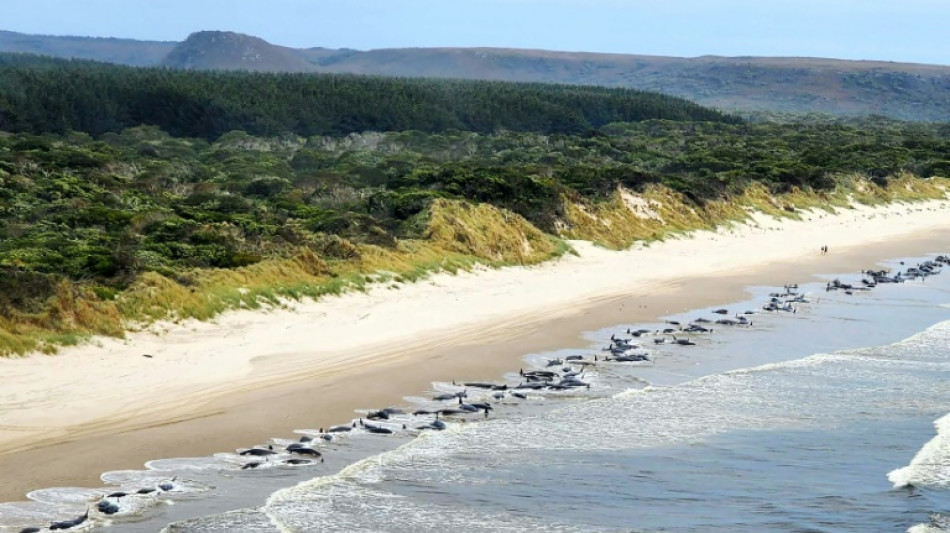
230 pilot whales stranded in Australia, 'about half' feared dead

A pod of 230 pilot whales was found stranded on the rugged west coast of Tasmania Wednesday, with Australian officials saying only half appeared to be alive.
Aerial images showed a devastating scene of dozens of black glossy mammals strewn across a long beach, stuck on the waterline where the frigid southern ocean meets the sand.
Locals covered survivors with blankets and doused them with buckets of water to keep them alive, as other whales nearby tried in vain to twitch free and yet more lay dead.
The whales were "stranded near Macquarie Harbour" said the state's Department of Natural Resources and Environment.
"It appears about half of the animals are alive."
Officials said marine conservation experts and staff with whale rescue gear were en route to the scene.
They will try to refloat animals that are strong enough to survive and likely tow the carcasses out to sea, to avoid attracting sharks to the area.
It is almost two years to the day since Macquarie Harbour was the scene of the country's largest-ever mass stranding, involving almost 500 pilot whales.
More than 300 pilot whales died during that stranding, despite the efforts of dozens of volunteers who toiled for days in Tasmania's freezing waters to free them.
- Distress signals -
The cause of mass strandings is still not fully understood.
Scientists have suggested they could be caused by pods going off track after feeding too close to shore.
Pilot whales -- which can grow to more than six metres (20 feet) long -- are highly sociable and can follow podmates who stray into danger.
That sometimes occurs when old, sick or injured animals swim ashore and other pod members follow, trying to respond to the trapped whale's distress signals.
Others believe gently sloping beaches like those found in Tasmania confuse the whales' sonar making them think they are in open waters.
The news came just hours after a dozen young male sperm whales were reported dead in a separate mass stranding on King Island -- between Tasmania and the Australian mainland.
The young whales' deaths may be a case of "misadventure", wildlife biologist Kris Carlyon from the state government conservation agency told the local Mercury newspaper.
"The most common reason for stranding events is misadventure, they might have been foraging close to shore, there might have been food and possibly they were caught on a low tide," Carlyon said.
"That's the theory at the moment."
In nearby New Zealand strandings are also common.
There, around 300 animals beach themselves annually, according to official figures and it is not unusual for groups of between 20 and 50 pilot whales to run aground.
But numbers can run into the hundreds when a "super pod" is involved -- in 2017, there was a mass stranding of almost 700 pilot whales.
A.Graziadei--PV
